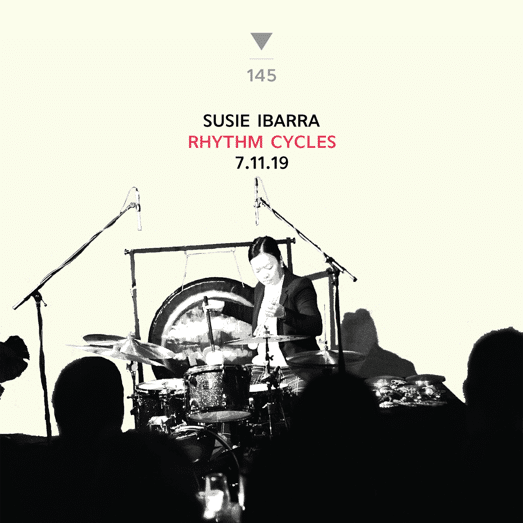30 Artists, 30 Years – Susie Ibarra
BF: We are still mesmerised by your solo performance at Café OTO in London last November as part of the Bagri Foundation’s curated music programme ‘At the Cutting Edge: Experimental Sounds of Asia.’ The programme was a series of concerts celebrating new music from across Asia and the diaspora, performed by outstanding natural collaborators influenced by cross-arts forms such as yourself. As you mentioned in your interview with the Foundation’s Head of Arts, Chelsea Pettitt, in that concert you performed Rhythm Cycles, a sonic of meditation on rhythmic cycles in which you weaved and shifted from ‘one rhythmic cycle to another, sometimes in long held tones and cycling textures to quick cut phrases and grooves’. How did you find the response of the London audience to your first solo concert in the city?
Susie Ibarra: I am immensely grateful to the Bagri Foundation for inviting me and commissioning the performance for At the Cutting Edge: Experimental Sounds of Asia. Your lineup was musically very diverse which I really appreciated. Yes, it was my FIRST solo concert in London 🙂 and I was really happy that you all were presenting at the historical experimental music venue Cafe OTO. There is so much history of amazing experimental music that has come through Cafe OTO. From curator and producer Chelsea Pettitt at the Bagri Foundation to Fielding Hope and the team at Cafe OTO everyone was so helpful with production. I had a great time performing and listening to the other acts on the evening.
I’m very excited to say that I was happy with the performance and recording. With the Bagri Foundation and OTO Projects we are releasing the live performance album of Rhythm Cycles – now on the Cafe OTO website! It was very serendipitous that OTO Projects has a digital label that archives concerts from Cafe OTO and timely that we would be able to share digitally meaningful work and concerts at this moment. It has just been released as of Wednesday, 25 November here: https://www.cafeoto.co.uk/shop/susie-ibarra-71119/
BF: Looking at one of the most recent news on your website, we noticed that you launched two sound packs on Splice Original label for producers and musicians to play your music and will soon launch your Himalayan sounds on the same platform. Can you tell us more about this generous gift to the music community and what else have you been working on lately?
SI: Thank you for asking. We launched in February 2020 the soundpack Himalayas on Splice Explores series for Splice. I am very happy to collaborate with Splice. They are a really wonderful music production platform that offers soundpacks through a subscriber platform.
https://splice.com/sounds/splice-explores/splice-explores-himalayas
https://www.youtube.com/watch?v=HOtV8raPvP0
It is my 3rd pack with Splice. The first two packs were both my own experimental percussion sounds and templates we built of electronic instruments that consisted of my percussion sounds. These sounds were recorded in Gangtok, Sikkim, Himalayas, neighboring India below, China above and Nepal, Bhutan and West Bengal. It is so very beautiful up there in the mountains and I didn’t realize how lush the bamboo forests are up there. It is also home to the endangered beautiful red panda.
These sounds include loops and one shots and event sounds of nature, many of which are water rhythms from glacier runoff. Some are natural sounds and some are manipulated in pitch . Some of these sounds I utilized to play rhythms and loops.

BF: As an interdisciplinary composer, percussionist, and sound artist you are interested in the many intersections of music and society. We wonder how your practice is being shaped by the fast-changing international environment we are all navigating this year?
SI: Wow, that’s a big question. Yes, we are all navigating Covid-19 and its affects across the world. It is incredible to see and feel how fast changing and fast paced everything is, and how busy we are while we are on stay at home orders and places are slowly opening up with trepidation. Its been for me its been 10 and 1/2 weeks home. I think I’ve felt the grief up and down as I move through the cycles of our changing world each week. My research and field recording , concerts, premieres and commissions have shifts and postponed to later dates some that are not reset yet. Performance has shifted quickly to live stream events. I performed for a live stream event for TED Social on the series Virtual Virtuosos to help support artists grants with the New Music USA Artists Solidarity Fund. I was supposed to have a concert with flutist and composer Nicole Mitchell in June 3 which is obviously cancelled. I will record a video for a series she is curating on that day. I am prepping /practicing for this and a June 25 solo performance with Asia Society followed by a Q and A. My commission Fragility Etudes for the Asia Society Triennial We Do Not Dream Alone is postponed from July to premiere November 20, 2020. Both these live stream performances I will perform from my music room at home.
For performance I am navigating learning best practices for live stream performances and am grateful to be able to learn and share this with my performer peers and receive help and guidance remotely with collaborating recording and sound engineers I have worked with. I do my best to show up for my friends performances live stream when I can. I really enjoy listening to them and it is a confirmation that even though it has moved into a digital stream, it is still live in the moment and we are connecting in a very meaningful way.
I am struck by how we remain or have increased our connectivity digitally and virtually while we are in this period of remaining at home. I am staying connected to communities that I often collaborate with interdisciplinary work. This year I am very honored to be a National Geographic Explorer grantee in storytelling. This is in support of my on going work with Himalayan Glacier Soundscapes and my collaboration with Glaciologist and Geographer Michele Koppes in telling a cultural story by listening to climate change. I feel that now more than ever amidst the pandemic climate grief is an essential and urgent conversation.
Water Rhythms: Listening to climate change, a sonic cultural story of how humans and nature are intertwined through freshwater, and how climate change is endangering our water, our health and our music. Only 2.5% of water on Earth is freshwater, and of this, 99% comes from glaciers. As glaciers worldwide are disappearing in response to climate change, water availability and water quality are being threatened for the billions of people who live downstream. Humans are inextricably connected to the earth’s fresh water as a basic building block of life; the rhythms of water flow through our bodies, our histories and our music. A world losing its flowing water is a world losing its music and its humanity.
Water Rhythms is the story of the dualism of nature and humans, connected through water, a story both beautiful and endangered. As we look to our future post-pandemic, we are all trying to build resilience in the face of upcoming food and water scarcity, increasing poverty and restoring health across the planet. Water Rhythms will be created as an intergenerational story that shares the deeper meaning of our human connection to nature through water and music.

I have invited Wolfgang Gil and TheHonkTweet into conversation to help build the software and hardware with an open source sound library for people to use and research to create a recorder and transmitter to receive sound year round from glaciers. I also invite them in to contemplate the building materials of new musical instruments I will build for performance and sound installation. So I’m at home in the development of this, as our field recording production has stopped until we are able to go next to Satopanth and sacred Gangotri glacier to record, research and install. I am taking webinars with Nat Geo’s geographers and cartographers on mapping and cartographic design and will be sharing the field recording stories on ESRI Maps.
I am also taking a webinar on Archival Storytelling for artists with Jocelyn Arem. It is helping me to think about this project and the book and building of a physical audio prototype for a rhythm game as an intergenerational story and artist experience. It is also helping me to think about how this will engage with the platforms of today. Also, in this strange time period are deadlines for compositions and grants.
I am very fortunate to be involved in the introspective work of practicing my instruments, building, composing and will be stepping into performing more live streams. In this early moment of change, I think we cannot say what this means for artistic and performing artistic practice. It is an immediate hit and for venues and theatres and halls we don’t know how long it will be. I received a notice from one residency venue in NYC that it may open after September but audiences would be halved and woodwinds and voice would not be permitted for performance. Its both sad and bizarre. I think we are all trying to move through this moment and support as much positivity that we can.
I’m really grateful to be able to sit in my art and music practice and to be able to be safe and healthy at home. I have immediate and extended family who are in medicine in the US and Philippines. Grateful they are doing alright , but their daily lives are so different than mine.
It is also a time that I think social work is very relevant. However we can do that in our communities close to us and communities we are called upon or drawn to support, I think it is an essential individual and group act. I am focusing my support towards helping artists in vulnerable communities.
Thank you to the Bagri Foundation for featuring my work this month and a big congratulations for the 30th anniversary! It’s been an honour to be invited and commissioned and wonderful to engage in this artistic community! So excited that we are able to document this meeting in the live solo album, Rhythm Cycles!
– Susie Ibarra was interviewed by Alessandra Cianetti in May 2020, with updates added in November 2020.

Biography
Susie Ibarra is a Filipina-American composer, percussionist, and sound artist. Her sound has been described as “a sound like no other’s, incorporating the unique percussion and musical approach of her Filipino heritage with her flowing jazz drumset style” (Modern Drummer Magazine) and her compositions are sometimes described as “calling up the movements of the human body; elsewhere it’s a landscape vanishing in the last light, or the path a waterway might trace” (New York Times). Recent commissions include Kronos String Quartet’s 50 for the Future Project Pulsation, PRISM Saxophone Quartet + Percussion’s Procession Along the Aciga Tree, Talking Gong trio with pianist Alex Peh and flautist Claire Chase, film score When the Storm Fades directed by Sean Devlin, and a multimedia game piece Fragility: An Exploration of Polyrhythms for Asia Society.
Susie Ibarra is a 2020 National Geographic Explorer grantee in Storytelling and 2019 United States Artist Fellow in Music. She is a 2014 Senior TED Fellow and a 2018 Asian Cultural Council Fellow in support of her sound research of An Acoustic Story on Climate Change: Himalayan Glacier Soundscapes. She is recording and researching sound along the Ganges from source to sink in collaboration with glaciologist and geomorphologist Michele Koppes. Ibarra leads the DreamTime Ensemble, which recently released the album Perception, a suite of music exploring memory and shifting sensory experiences. She performs in collaborative ensembles Mephista, Yunohana Variations, and LIMBS. With ThinkFun Games, Ibarra is inventing an interactive polyrhythm game to teach rhythms. Since 2012, she has been a faculty member at Bennington College where she teaches percussion, performance, improvisation, and art intervention. Susie Ibarra is a Yamaha, Vic Firth, and Zildjian Drum Artist.


